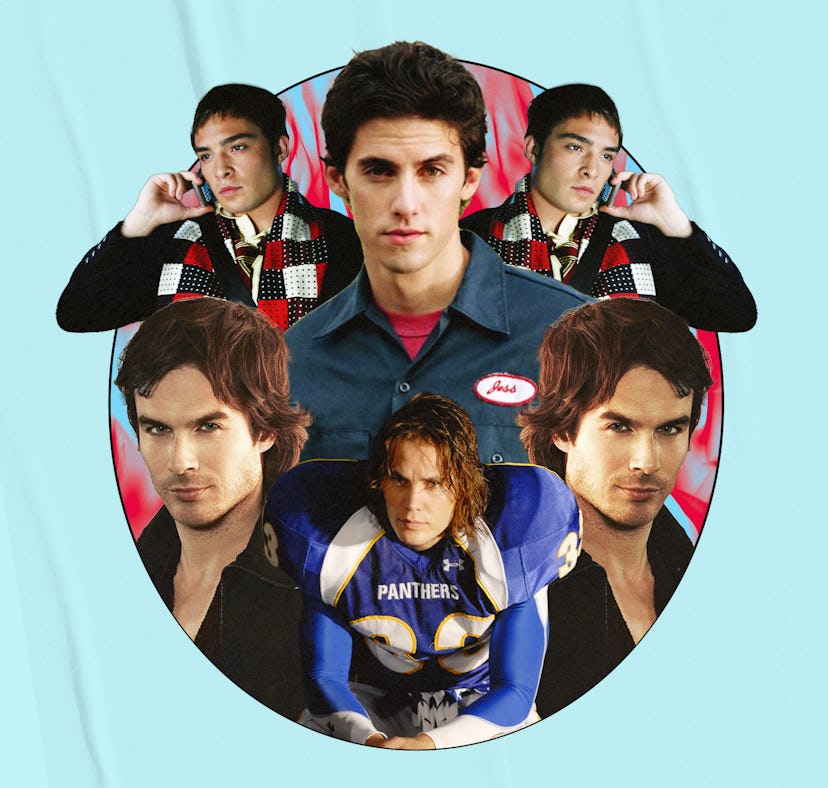
Unpacking The Enduring Appeal Of The 2000s-Era TV Bad Boy
They’re toxic, but we root for them.
In 2024, men are leading with softness first. It’s an era where NFL superstars make friendship bracelets to manifest romance, where Hollywood heartthrobs wear the internet’s babygirl badge proudly, where Timothée Chalamet can use his delicate hands to execute a Willy Wonka jazz square sequence one day and make out with Kylie Jenner at a Beyoncé concert the next. But it’s been a while since a man really took me out at the knees, and I think I know why.
The soft jocks and the himbos and the babygirls and the golden retriever boyfriends — these are not the same leading men who ravaged my hormones during the ‘00s and 2010s. I’m talking about One Tree Hill’s Nathan Scott, Gossip Girl’s Chuck Bass, The Vampire Diaries’ Damon Salvatore, Gilmore Girls’ Logan Huntzberger and Jess Mariano, Friday Night Lights’ Tim Riggins, and Veronica Mars’ Logan Echolls (really any Logan should be on this list). The real crème de la crème of emotionally unavailable hot dudes, who led with cruelty first to mask their delicate egos.
Before Taylor Swift was writing an album of tortured poetry about a guy who “hasn’t really listened to that much of it, but I’m sure it’s good,” there was a CW writers room working overtime to deliver us “The Bad Boy.” As a person who came of age watching existential angst wrap itself in low-rise leather pants and strut around to the name of Damon, you could say I’ve fallen prey, and I’ve never really gotten over it.
These guys stand in stark contrast to Gen Z’s version of the cis-hetero heartthrob: emotionally mature, nontoxic men who aren’t afraid to show traditionally “feminine” characteristics. Guys like the Bridgerton boys, who yearn like it’s their full-time job, or Jeremiah Fisher from The Summer I Turned Pretty, who instead of staying quiet when he experienced an emotion (cough, Conrad) did the mature thing and told Belly how he felt.
There was always a reason for their bad behavior, however flimsy and poorly plotted that reason may be.
It’s a shock, then, that aughts-era television still reigns supreme with fandoms and streaming sites. Gilmore Girls, for example, streams in the billions. TikTok fan edits help some of these shows go viral, even 20 years after premiering. Videos that declare “I’m Chuck Bass” as their Roman Empire or investigate Logan Huntzberger’s rizz conjure these heartthrobs back into the pop culture landscape all over again.
Even though the romance formula has changed, clearly there’s still something alluring about these heroes if they continue to dominate the minds of our culture. Maybe it’s that bad guys winning dismantles the rom-com golden rule that the good guy always wins — and that we should want him to. Or maybe it’s that in the emotionally stunted years that made up the aughts, years where hypermasculine debauchery was literally a bestselling idea, seeing toxic men break down was the closest we’d come to witnessing male vulnerability.
In this era, the good guy was strong, silent, and broody — emotionally flat because he was always doing the right thing and secretly protecting the heroine from her own worst inclinations. Dean from Gilmore Girls, Lucas Scott from One Tree Hill, and Stephan Salvatore from The Vampire Diaries are examples of the good guy formula at work. They were 2D compared to the swaggering (Logan), smirking (Nathan), and vaguely hostile (Damon) bad boy introduced as the narrative foil. He’d say things like “Don’t mock the scarf, Nathaniel, it’s my signature.” He could call Rory Gilmore “Ace” and convince her to steal a yacht. When Nathan Scott dropped the pickup line, “Don’t say I never gave you anything,” he gave me a starting point for my therapy sessions.
I’d argue that the thing that continues to entrap audiences is that these guys weren’t totally unsaveable. They offered a glimmer of redemption, a crack in the armor. There was always a reason for their bad behavior, however flimsy and poorly plotted that reason may be.
Chuck Bass’ dad didn’t love him. Nathan Scott had daddy issues and a half-brother coming for his spot on the basketball team. Damon Salvatore’s Victorian-era girlfriend cheated on him with his brother after she turned him into an immortal creature of the night. Logan Huntzberger was born on the wrong side of the tracks (...the 1%). Logan Echolls’ dad was a criminal.
These backstories prove the apple isn’t rotten right to the core. If there’s a reason for their cruelty, there’s a chance they can be fixed — and this secret softness is actually what connects them to the babygirls of today. Both prototypes have the ability to let their guards down and be vulnerable. Sure, the bad boy needs massive obstacles to excavate his feelings, but he still has to give up some of his toxic masculinity to get the girl.
This sacrifice is something the romance genre has always required: vulnerability as a means to obtain a happy ending. The difference is that now, audiences want more than just a tragic backstory to make a man crush-worthy. We’d rather not perform a mental gymnastics sequence that rivals a Simone Biles floor routine in our heads to root for him.
But every once in a while, as I rot in bed, I like to fall into the comforting rhythm of watching some prepped-up bonehead with the emotional wingspan of a mosquito pretend to experience human emotions. What can I say? But daddy, I love him.